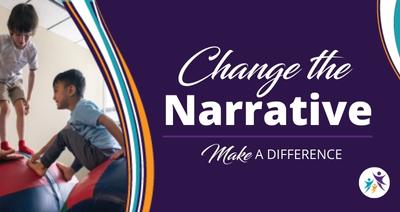2022 Annual Appeal

Dear Friend of STAR,
We live in a culture where differences, disorders, and disabilities are equated to brokenness. For many people, the natural next step is figuring out how to fix or cure this brokenness. At STAR, we’re asking: how can we stop mislabeling and misunderstanding humans as broken just because they are different? The answer begins with you. You can change the narrative. Will you be a changemaker today?
STAR Institute is fighting to change this stigma through sensory processing education, therapy, and research. Sensory integration and processing is how we feel—how our brain and body work together to produce responses to the world and how we construct our reality. And this is different for everyone! It’s why some people prefer chewy or crunchy snacks. It’s why roller coasters are either exhilarating or terrifying. It’s why there are a hundred different ways to potty train. We see most of these nuances as preferences. But what happens when someone’s differences in sensory processing are so great that it impacts their daily life?
John and Erica, parents of 7 year-old STAR client, Olivia, share, “Olivia was fiery from birth. She came out early at 32 weeks, as a 2 pound 6 ounce little nugget, and has always been a go-getter. From the start, we were enrolled in different therapies. At 3 years old she was placed on an IEP and started preschool…We didn’t really see any behaviors until the first grade—then it hit us like a sack of potatoes. She had a very hard time with transitions, and with just staying in the general classroom and all the noises in the room. She wouldn’t do anything in the classroom and would get pulled out after outbursts.”
It is estimated that 1 in every 6 people have differences in sensory processing that could be considered disordered. Think about that, 1 in every 6. That means we all know someone, and more likely a lot of people, whose sensory integration differences have caused: challenges with learning, school suspension or expulsion, difficulty finding or keeping a job, strained relationships, feelings of isolation, mental health challenges, difficulties with eating, etc. We know that there are supports in place to address some of these issues, but what if we got down to the root cause instead of just the “symptoms”?
Erica continues, “Somebody had told us about the STAR Institute. So, we found the Superhero in Training Camp and got enrolled (a group focusing on social success and communication). After the camp, we would see little bits here and there, but the rest of the school year was still difficult. It felt like the school had a ‘box of tactics’ for children, but it never adjusted to Olivia and never got down to the root of it.”
Education and awareness about the mechanisms of how we process and integrate sensation are key! When we understand why a child is running out of the classroom constantly, why a first-year college student is missing classes and skipping meals, or why a parent is constantly exhausted and on edge, we can better address and support the individual’s needs. Our empathy expands when we know the root cause. Therapy services and supports are most effective when you address the issue instead of the symptom.
The child isn’t broken. She just doesn’t know what to do when the lights are constantly buzzing, there’s too many things on the walls, and the teacher is saying all the directions for an assignment at once. The college student isn’t broken. They no longer have the same supports to make sure they have a plan to get to class on time, and there are so many new choices in the cafeteria that it’s just easier to not eat! The parent isn’t broken. He just doesn’t realize that the constant touch from his children during the day has overdrawn his capacity for physical touch. So when he’s physically distant from his spouse each night it isn’t because of anything they’ve done, he just needs a different form of connection and doesn’t know how to advocate for it.
With your help, we can change the narrative. Your donation provides education, awareness, therapy services, and research to address sensory processing and integration.
Your gift today will:
-
Educate care providers throughout the world on sensory-informed care and best practices. ($50+/course)
-
Increase awareness of the importance of sensory health through free and low-cost training and education events for parents, teachers, leaders, spouses, etc. ($10/person)
-
Expand therapy services for low-resource families to receive neurodiversity affirming care and treatment programs at STAR. ($230/therapy session)
-
Further research to better support neurodivergent individuals. ($1,000+/project)
Olivia and her parents began an occupational therapy program at STAR a year later. They share, “Olivia is different this year, and it’s fantastic to see! She’s reading like a champ, and spelling and writing…I truly can’t say enough good things about this past year…The teacher we have now is wonderful! He realizes that maybe the group setting on the rug right now is overwhelming to her. She wants to sit on a pillow over [near a corner]. She’s listening; she’s paying attention; she can answer things. But that is what she needs for the moment. And he realizes it and sees it.”
Will you donate today and help families like Olivia’s?
Dr. Virginia Spielmann, Executive Director
P.S. Your tax-deductible donation doesn’t stop here! Your gift creates a ripple effect.
When one doctor or therapist is sensory-trained their entire practice receives better care.
When one teacher adjusts their classroom to meet all sensory needs, all students thrive.
When one person receives services at STAR their family and community learn more about
sensory processing, widening their acceptance and love for neurodivergent individuals.
Put your gift to work faster by donating online at www.givebutter.com/star2022.
Remember, your gift is tax-deductible for 2022 if you make it on or before December 31st!
